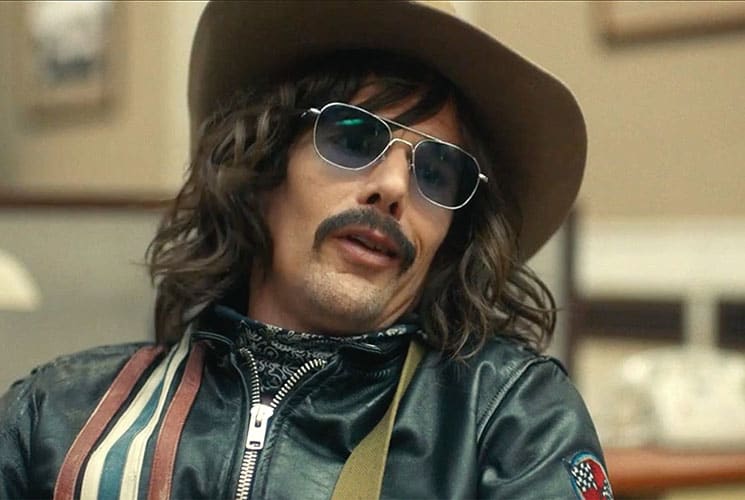A couple years ago, a producer handed writer-director Robert Budreau a New Yorker article from 1975. It was about a Swedish bank heist from a couple years prior, in which the hostages ended up siding with their captors. That case was the origin of the term "Stockholm syndrome."
"I liked the fact that it contains elements of fun genres," Budreau tells Exclaim! "It has bank heist elements, it has thriller elements. But ultimately it's really a character study, and it's got these rich, strange, conflicted characters."
That article was the basis of the Canadian-born filmmaker's latest feature, Stockholm. Ethan Hawke stars as Lars (pictured), a Swedish-American robber who enters a bank with a gun and takes hostages. He plans to negotiate the release of his incarcerated friend Gunnar Sorensson (Mark Strong), but along the way develops an unexpected rapport with one of his hostages, a married mom of two named Bianca (Noomi Rapace).
It's easy to empathize with Bianca, who does whatever it takes to stay alive and get back home to her family. In an absurd situation, she is Stockholm's grounding presence. "It was important for us to not just paint her as a pure victim — but to empower her to make some of her own decisions and have her own strength, even though she's a hostage," Budreau reflects.
Bianca develops a bond with her captor, and it's clear why, since Lars is easy to love: he's obsessed with Bob Dylan, likes playing cards and is kind towards his hostages. Even when he's wielding a gun, he's charming rather than sinister. "I had written the script with a dark comic tone that Ethan brought out even more," Budreau says. "He's quite a naturally sympathetic person, so he's able to play these idiotic, bad characters, but make them kind of likeable in an odd way."
Ultimately, audiences will experience their own form of Stockholm syndrome while watching the film: even when Lars is holding hostages as gunpoint, he's much more compelling and likeable than the police. The conventional "cops and robbers" narrative is flipped on its head, as the gun-toting criminals become the good guys. This, Burdreau says, is exactly what he intended.
"You try to imagine: what would we do if we were in that situation?" And it's hard to know what you would do if you were stuck in a vault, at any minute ready to die, for days on end. You'd do some pretty weird stuff."
"I liked the fact that it contains elements of fun genres," Budreau tells Exclaim! "It has bank heist elements, it has thriller elements. But ultimately it's really a character study, and it's got these rich, strange, conflicted characters."
That article was the basis of the Canadian-born filmmaker's latest feature, Stockholm. Ethan Hawke stars as Lars (pictured), a Swedish-American robber who enters a bank with a gun and takes hostages. He plans to negotiate the release of his incarcerated friend Gunnar Sorensson (Mark Strong), but along the way develops an unexpected rapport with one of his hostages, a married mom of two named Bianca (Noomi Rapace).
It's easy to empathize with Bianca, who does whatever it takes to stay alive and get back home to her family. In an absurd situation, she is Stockholm's grounding presence. "It was important for us to not just paint her as a pure victim — but to empower her to make some of her own decisions and have her own strength, even though she's a hostage," Budreau reflects.
Bianca develops a bond with her captor, and it's clear why, since Lars is easy to love: he's obsessed with Bob Dylan, likes playing cards and is kind towards his hostages. Even when he's wielding a gun, he's charming rather than sinister. "I had written the script with a dark comic tone that Ethan brought out even more," Budreau says. "He's quite a naturally sympathetic person, so he's able to play these idiotic, bad characters, but make them kind of likeable in an odd way."
Ultimately, audiences will experience their own form of Stockholm syndrome while watching the film: even when Lars is holding hostages as gunpoint, he's much more compelling and likeable than the police. The conventional "cops and robbers" narrative is flipped on its head, as the gun-toting criminals become the good guys. This, Burdreau says, is exactly what he intended.
"You try to imagine: what would we do if we were in that situation?" And it's hard to know what you would do if you were stuck in a vault, at any minute ready to die, for days on end. You'd do some pretty weird stuff."




